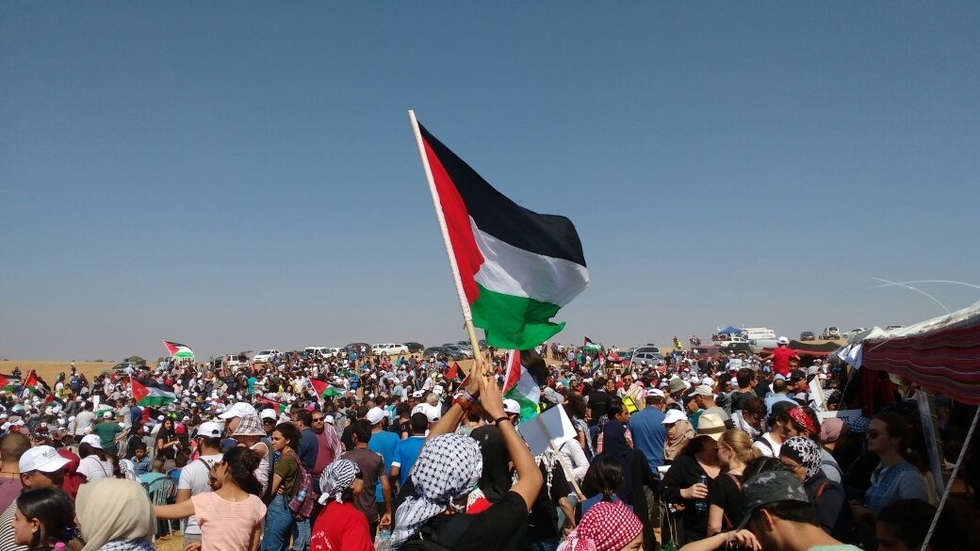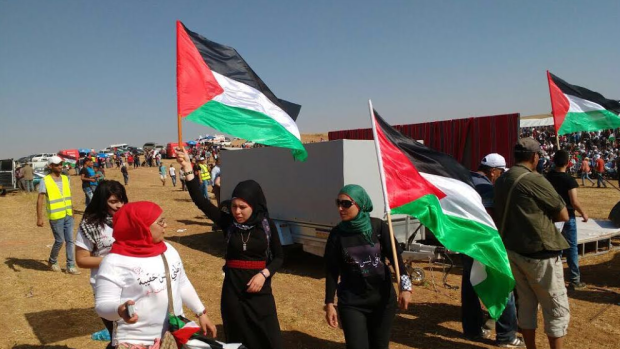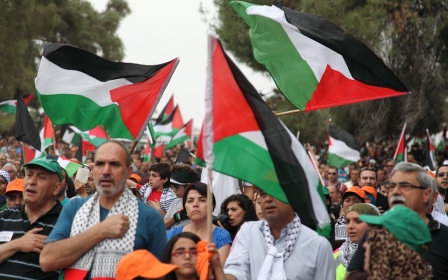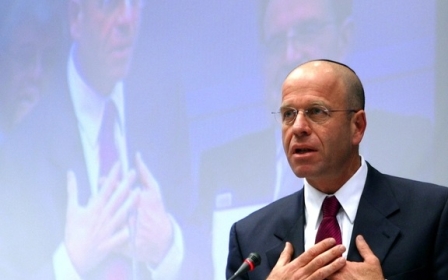Palestinians march to demand ‘right of return’ on Nakba anniversary

Thousands of Palestinians gathered in southern Israel on Thursday to declare their refusal to give up the “right of return” as part of commemorations to mark the 68th anniversary of the mass expulsion and atrocities that took place upon Israel’s establishment.
The annual march to mark the Nakba, or catastrophe, of more than 700,000 Palestinians who were expelled from Israel as it was established in 1948, took place in the Negev desert for the first time. While there are scores of smaller commemorations every year, the main march always happens in a different village that was uprooted.
A sea of Palestinian flags fluttered in the wind as thousands of people defiantly strode through the desert near the Bedouin village of Rahat, with many holding signs demanding that millions of Palestinian refugees be allowed to return to homes taken by Israel.
Organisers said the march took place in the Negev desert because the Palestinians living there had “paid the highest price” in terms of constant housing demolitions and displacement.
Speakers decried Israel’s displacement of “over 90 percent” of Palestinians living in the Negev, and called for all those expelled from their homes to be able to return.
“We will never give up, and we will never forget,” crowds of people chanted in a festival-like atmosphere with stalls and exhibitions promoting Palestinian solidarity groups and traditional Palestinian arts and crafts.
The march took place at the same time Israelis celebrated the anniversary of their country’s beginning, which the Negev rally noted with the name of their event: “Their independence day is our Nakba day."
While the speakers were from an older generation, the 40-plus buses that arrived in the Negev carried mostly younger Palestinians from villages throughout Israel.
The right of return for Palestinian refugees was at the heart of the event, which is the beginning of commemorations to mark the Nakba on 15 May.
“For the Palestinians, the Nabka isn’t just a historical event, but a personal wound in the heart of every refugee and displaced person,” said Mohammed Barakeh, head of the Higher Arab Monitoring Committee.
“People didn’t flee, as some claim, but were uprooted. Yet even if they fled, they fled out of fear and suspicion, due to the crimes that were committed. And this doesn’t cancel out their right to return.
“What happened in the Nakba was a crime of slaughter and displacement, and it’s impossible to correct this injustice without ensuring the right of return.
“What’s happening today is clear. Israel is degenerating into an apartheid state, but still, the world praises Israeli democracy.”
The Higher Arab Monitoring Committee in Israel, which coordinates between Palestinian political and civil society groups, organised the event, which was marked by regular intervals of silence in remembrance of Palestinians killed since 1948.
The committee said the march was taking place against the backdrop of a “racist wave” against Palestinians led by the Israeli government of Prime Minister Benjamin Netanyahu.
Ayman Odeh, who is head of the Joint List of Palestinian-dominated political parties, said the Nakba is not just an event from the past.
“The question of the Nakba isn’t a question of the past, but a question of the future,” he said.
“Recognising the Nakba, this terrible crime, and working to correct the injustice is the only path to true reconciliation between the two peoples.
“I’d like to stress the importance of our being here in the Negev today to mark the Nabka and express our determination to demand recognition of the injustices that were done and achievement of a just solution that will ensure the people’s rights.”
New MEE newsletter: Jerusalem Dispatch
Sign up to get the latest insights and analysis on Israel-Palestine, alongside Turkey Unpacked and other MEE newsletters
Middle East Eye delivers independent and unrivalled coverage and analysis of the Middle East, North Africa and beyond. To learn more about republishing this content and the associated fees, please fill out this form. More about MEE can be found here.






